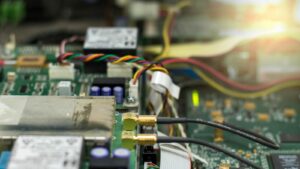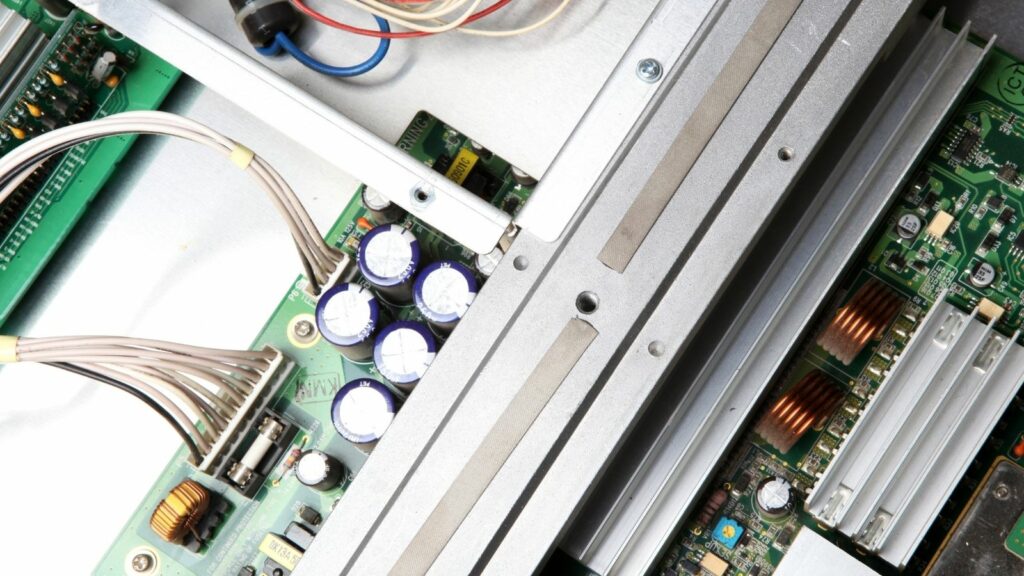”
Key Takeaways
- Role of Computer Hardware Engineers: Computer hardware engineers design, develop, and test the physical components of computing systems, ensuring seamless integration with software for optimal performance.
- Skills Required: Essential skills include circuit design, embedded systems knowledge, testing methodologies, and CAD software proficiency, along with strong communication, problem-solving, and teamwork abilities.
- Educational Pathways: A bachelor’s degree in computer or electrical engineering is typically required, with advanced degrees and certifications enhancing job prospects.
- Job Outlook: Employment for computer hardware engineers is expected to grow by 2% from 2020 to 2030, reflecting ongoing demand in various industries like technology and telecommunications.
- Career Opportunities: Computer hardware engineers can pursue diverse roles such as development engineer, test engineer, systems architect, and project manager, with opportunities for advancement through continued education and certifications.
- Industry Collaboration: Collaboration between hardware and software engineers is critical for developing innovative technologies and enhancing overall system performance.
In today’s tech-driven world, computer hardware engineers play a crucial role in shaping the devices that power our daily lives. These professionals design, develop, and test the physical components of computers, from processors to circuit boards. Their expertise ensures that hardware works seamlessly with software, creating efficient and reliable systems.
With the rapid advancement of technology, the demand for skilled hardware engineers continues to rise. They not only work on personal computers but also contribute to innovations in smartphones, gaming consoles, and embedded systems. Understanding what a computer hardware engineer does reveals the intricate blend of creativity and technical knowledge required to excel in this exciting field.
What Is A Computer Hardware Engineer
 Computer hardware engineering involves the design, development, and testing of physical components in computing systems. These professionals focus on various hardware elements, including processors, circuit boards, memory devices, and networking equipment. They ensure these components function correctly together and meet performance, reliability, and energy efficiency standards.
Computer hardware engineering involves the design, development, and testing of physical components in computing systems. These professionals focus on various hardware elements, including processors, circuit boards, memory devices, and networking equipment. They ensure these components function correctly together and meet performance, reliability, and energy efficiency standards.
Innovative problem-solving skills enable computer hardware engineers to create new technologies. They often work collaboratively with software engineers to guarantee compatibility between hardware and software systems. This cooperation enhances overall system performance, driving advancements in consumer electronics, telecommunications, and information technology.
Familiarity with industry-specific tools, such as circuit simulation software and computer-aided design (CAD) programs, is crucial for hardware engineers. Continuous education and staying current with technological trends are necessary to maintain a competitive edge in this evolving field. As systems become more complex, the expertise of computer hardware engineers remains essential for developing next-generation devices.
Computer hardware engineering plays a critical role in technological progress, requiring a blend of creativity and technical skills to develop efficient, high-performance computing hardware.
Roles and Responsibilities of a Computer Hardware Engineer
Computer hardware engineers play a crucial role in the development of computing systems. Their responsibilities encompass designing, testing, and integrating hardware components essential for device functionality.
Design and Development
Computer hardware engineers design and develop critical components such as processors, circuit boards, memory devices, and networking equipment. They create detailed specifications and conceptual blueprints, ensuring each component meets performance and reliability standards. Engineers utilize computer-aided design (CAD) software to create prototypes and refine designs, focusing on enhancing efficiency and reducing production costs. They also analyze technical requirements to ensure system compatibility and optimize overall performance.
Testing and Evaluation
Computer hardware engineers conduct rigorous testing and evaluation of hardware components. They implement various testing methods, including functional, reliability, and performance tests, to identify potential issues prior to production. Engineers analyze test results to ensure compliance with industry standards and recommend design modifications as necessary. They also troubleshoot hardware problems, verifying that all components operate effectively within the system.
Collaboration with Other Engineers
Computer hardware engineers collaborate closely with software engineers, ensuring seamless integration between hardware and software components. They participate in cross-functional teams that include firmware developers and system architects to address compatibility challenges and enhance overall system functionality. This interdisciplinary approach fosters innovation and drives advancements in technology, allowing engineers to develop solutions that meet emerging consumer needs.
Essential Skills for Computer Hardware Engineers
Computer hardware engineers require a diverse skill set to succeed in their roles. These skills include both technical expertise and interpersonal abilities that facilitate collaboration and innovation.
Technical Skills
- Circuit Design: Knowledge of designing electronic circuits is essential. Engineers must utilize software tools for creating schematics and layouts, which is fundamental in hardware development.
- Embedded Systems: Familiarity with embedded system programming is critical for integrating hardware functionality. Understanding microcontrollers and real-time operating systems enables engineers to optimize performance.
- Testing and Debugging: Proficiency in testing methodologies, such as functional and stress testing, allows engineers to identify and rectify hardware issues effectively. Mastery of debugging tools is necessary for diagnosing problems in systems.
- Computer-Aided Design (CAD): Skills in CAD software enable engineers to create precise designs and models of hardware components. This knowledge aids in visualizing and simulating designs before physical production.
- Data Analysis: Ability to analyze and interpret data from tests plays a significant role in improving hardware. Using analytics helps engineers make informed decisions about design adjustments.
- Familiarity with Standards: Awareness of industry standards ensures compliance during hardware development. Engineers must stay informed about regulations that govern safety and performance.
- Communication: Strong communication skills are vital for collaborating with team members and presenting ideas. Engineers must articulate technical concepts clearly to non-technical stakeholders.
- Problem Solving: The capacity to think critically and address challenges enhances the engineering process. Innovative problem-solving leads to effective solutions in hardware design and functionality.
- Teamwork: Collaboration with software engineers and other professionals fosters a cooperative work environment. Success in projects often hinges on effective teamwork and shared goals.
- Adaptability: Flexibility in adapting to new technologies and methodologies is crucial. With the rapid evolution of technology, engineers must embrace change to remain effective.
- Attention to Detail: Precision in working with intricate components is non-negotiable. A keen eye for detail ensures the reliability and functionality of hardware products.
- Time Management: The ability to prioritize tasks and manage deadlines is essential in meeting project objectives. Efficient time management allows engineers to balance multiple responsibilities effectively.
Educational Pathways to Becoming a Computer Hardware Engineer
A solid educational foundation is crucial for aspiring computer hardware engineers. This pathway typically involves obtaining relevant degrees and training to develop the necessary skills.
Degree Requirements
Most computer hardware engineers possess at least a bachelor’s degree in computer engineering, electrical engineering, or a related field. Coursework often covers essential subjects, including:
- Electrical circuits
- Digital logic design
- Microprocessor systems
- Hardware architecture
- Programming languages
Some positions may require a master’s degree or higher for advanced roles, especially in research or specialized fields. A Ph.D. might be necessary for those pursuing academic or high-level research positions.
Certifications and Training
 Certifications enhance a computer hardware engineer’s credibility and expertise. Relevant certifications include:
Certifications enhance a computer hardware engineer’s credibility and expertise. Relevant certifications include:
- Certified Hardware Engineer (CHE): Validates knowledge in hardware design and troubleshooting.
- CompTIA A+: Demonstrates proficiency in computer hardware and software.
- Cisco Certified Network Associate (CCNA): Ensures knowledge of networking concepts and hardware.
Specialized training programs and workshops often provide hands-on experience in areas like circuit design, computer-aided design (CAD) software, and testing methodologies. Continuous education through seminars and courses helps engineers stay updated with the latest industry standards and technological advancements.
Career Outlook and Opportunities
The career outlook for computer hardware engineers remains promising as technology continues to advance. According to the U.S. Bureau of Labor Statistics (BLS), employment for computer hardware engineers is projected to grow by 2% from 2020 to 2030. This growth aligns with the increasing demand for innovative hardware solutions that support emerging technologies like artificial intelligence, machine learning, and the Internet of Things (IoT).
Opportunities for computer hardware engineers exist across various industries, including technology, telecommunications, and consumer electronics. Specific roles include:
- Development Engineer: Designs new hardware components and systems.
- Test Engineer: Conducts rigorous evaluations to ensure component reliability and performance.
- Systems Architect: Integrates hardware and software components for optimal functionality.
- Project Manager: Oversees hardware development projects from inception to completion.
Engineers also participate in research and development (R&D), working on cutting-edge technologies that drive industry innovation. With a strong foundation in engineering principles and continuous education, computer hardware engineers can transition into roles such as technical consultants, product managers, or even academia.
Networking opportunities, such as industry conferences and professional organizations, enhance career growth and allow engineers to stay updated on technological advancements. Furthermore, pursuing certifications and specialized training can lead to higher positions and increased earning potential, with median annual wages reported at $119,560 in May 2022. Overall, the landscape for computer hardware engineers presents a blend of stability and exciting opportunities, underscoring the critical nature of their contributions to technological evolution.
Shaping The Technology That Drives Modern Society
Computer hardware engineers play a crucial role in shaping the technology that drives modern society. Their expertise in designing and testing hardware components ensures that devices function seamlessly and meet the demands of users. As technology continues to evolve, the skills and knowledge of these engineers become increasingly important.
With a solid educational foundation and a commitment to continuous learning, they remain at the forefront of innovation. The growing demand for advanced hardware solutions across various industries highlights the significance of their contributions. As they tackle complex challenges and collaborate with other professionals, computer hardware engineers will continue to be instrumental in the advancement of technology.
“



